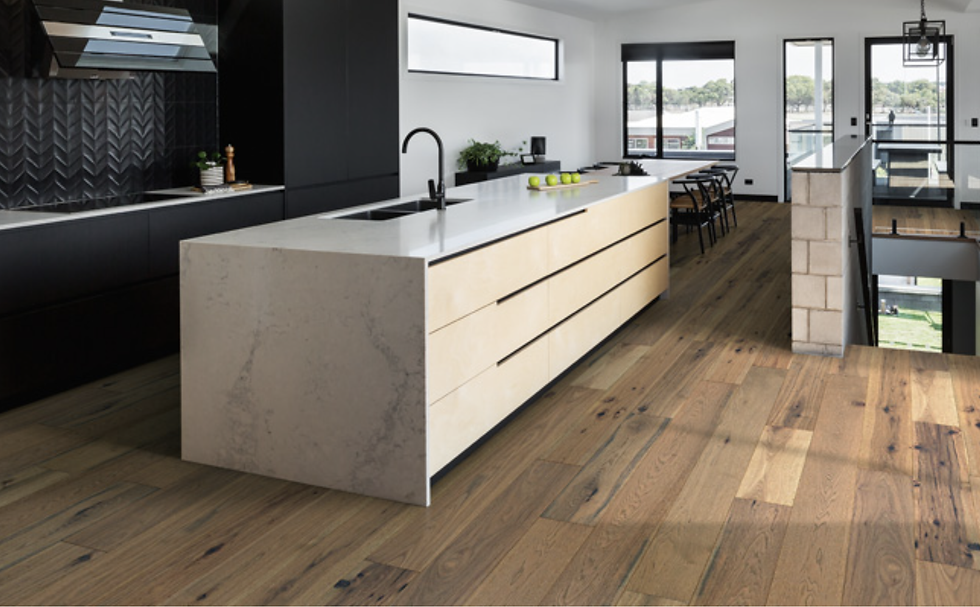Solid vs. Engineered Hardwood: Which Flooring Is Better for Your Home?
- southcoasteventman
- Nov 24, 2025
- 2 min read

Choosing between solid hardwood and engineered hardwood flooring isn’t just a style preference—it’s a long-term investment in your home. Both options offer the warmth, beauty, and value of real wood, but they behave differently depending on moisture, traffic, installation needs, and maintenance. If you’re trying to determine the best hardwood flooring for your space, this guide breaks down everything you need to know.
What Is Solid Hardwood?
Solid hardwood flooring consists of single, solid wood planks—usually 3/4" thick—crafted from popular species such as oak, maple, and hickory. Known for durability and classic appeal, solid wood floors can last up to 100 years with proper care.
However, natural wood expands and contracts with moisture and temperature changes. That’s why solid hardwood is best suited for dry, stable areas like living rooms, dining rooms, and bedrooms.
A Major Benefit: Multiple Refinishing Opportunities
One of the biggest advantages of choosing solid hardwood is the ability to refinish the floors 4–6 times over their lifespan. This makes it easy to refresh the flooring, change stain colors, or erase signs of wear—even decades later.

What Is Engineered Hardwood?
Engineered hardwood flooring is also made of real wood, but the construction is different. Each plank features a hardwood top layer attached to a plywood or high-density fiberboard (HDF) core. This layered design provides enhanced moisture resistance and dimensional stability, making engineered hardwood ideal for:
Basements
Kitchens
Areas with humidity fluctuations
Installation over concrete or radiant heat
Some brands even offer waterproof engineered hardwood, giving homeowners the look of real wood with added protection against spills and moisture.
Can You Refinish Engineered Hardwood?
Yes—but it depends on the veneer thickness.
4mm veneer: Refinish 1–2 times
Under 2mm veneer: May not be refinishable
Always check veneer thickness when comparing engineered flooring options, as this directly impacts the floor’s longevity.
Engineered vs. Solid Hardwood: Key Differences
While the two look nearly identical once installed, their performance differs significantly.
Cost Comparison
Engineered Hardwood Costs:
Starts around $4.50 per sq. ft.
Typically ranges from $4.50–$16 per sq. ft.
Installation is often faster and more affordable
Better suited for wide-plank styles and larger projects
Solid Hardwood Costs:
Typically $5–$28 per sq. ft., depending on grade and species
Prefinished solid hardwood ranges from $6–$12 per sq. ft.
Higher grades with fewer imperfections cost more
Installation requires nail-down methods and more labor

How to Choose the Best Hardwood for Your Home
Consider your home’s layout, long-term plans, and environmental conditions:
Choose Engineered Hardwood If:
You're installing floors below grade or over concrete
Your region has high humidity
You want more budget-friendly options
You need flooring compatible with radiant heat
You prefer wider planks at a lower price
Choose Solid Hardwood If:
This is your forever home
You want the option to refinish floors multiple times
You’re looking for maximum long-term value
Your home has stable humidity levels
You want flooring that lasts 50–100 years
Final Thoughts
In the debate of solid hardwood vs. engineered hardwood, there is no single winner—only the best fit for your needs. Solid hardwood offers unmatched longevity, classic appeal, and multiple refinishing opportunities. Engineered hardwood brings versatility, moisture resistance, and cost-effective installation.
Whichever you choose, both options provide the timeless beauty of real wood while enhancing your home’s comfort, style, and overall value.





Comments